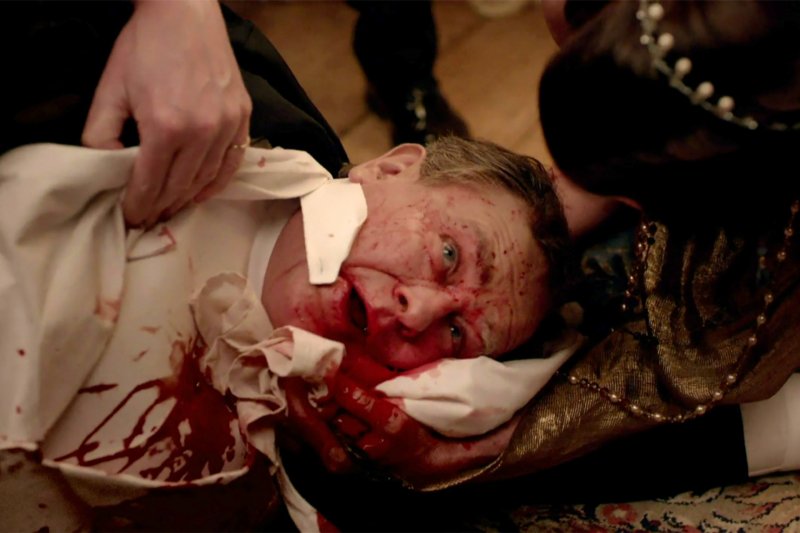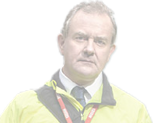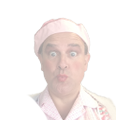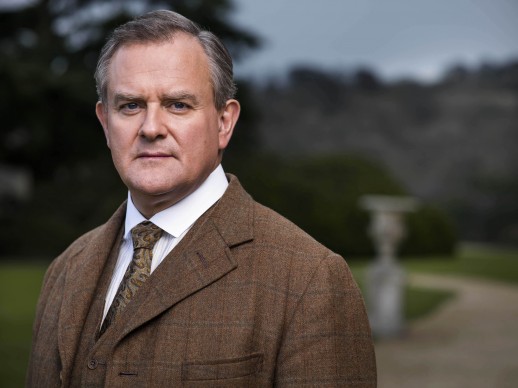Article by Tim Teeman for The Daily Beast
From Lord G’s marriage to Cora and class conflict, to crazy storylines and Dame Maggie Smith liking YouTube videos of cats, Hugh Bonneville reveals all about Downton Abbey—and his acting life afterwards.
On Sunday night, Lord Grantham—or “Raaarbert,” as his American wife Cora purringly knew him—contentedly oversaw a houseful of happy endings, the sweetest of which was the marriage of his daughter Edith to Bertie Pelham, and the sweatiest and most order-subverting of which was servant Anna having her and Mr Bates’s baby in Lady Mary’s bed.
Edith said she was amazed that she could be so happy, and more so her father for a child (aka “Poor Edith”) who, as he put it, “has hardly known a day’s happiness in the last ten years.”
In the six seasons of the show, Lord G, played by Hugh Bonneville, was assailed by social change all around him, whether that was having to accept that Downton and its purpose and structure needed to change, alongside gender equality and much more, usually precipitated by some kind of scandal.
He was a good sport about it all, and was less forbidding patriarch than a guy, happiest with a beloved canine at his feet and enjoying as quiet a life as possible of relative family harmony and doing the right thing.
Lord G’s own mini-saga in the finale was accepting Cora’s fulfillment in running the village hospital.
The silkily-voiced, very funny Bonneville talked to The Daily Beast about Lord Grantham’s sagas, puking up all that blood in one of the series’ most memorable scenes, Dame Maggie Smith’s love of cat videos on YouTube, and why the show reveled in both depth and silliness.
Of Sunday night’s much-anticipated finale in the US (shown in the UK on Christmas Day), Bonneville said, “For us, the wave has already broken on the beach and is now gently receding. It’s lovely to know another wave is about to break, and I’m already feeling nostalgic about it. It’s like saying goodbye to a respected ocean liner sailing into the sunset.”
Were you happy with Lord Grantham’s ending?
I thought it was very appropriate. I thought everyone had the right finale for their characters. Some threads are tied up, and some aren’t—just like in reality, I suppose.
It felt appropriate that Lord and Lady Grantham were left in pretty good shape to let the estate continue into the future, so I felt very happy. I loved the ending with Carson, and the sense of the old dog who had to go into retirement and still be cherished and allowed to be in his basket by the fire. And new life with Bates and Anna’s baby arriving. In true Downton style, there was something for everyone.
You had the scene of this final season, and possibly one of the best of the series, with that blood-vomiting scene.
When I first read it I wrote to Julian (Fellowes, Downton’s creator and sole writer) and said it would be a coup de télé: talk about a watercooler moment and so it proved. I’m thrilled we all pulled it off. Everyone had been chattering away and saying about Lord Grantham, “It’s so obvious he’s going to have heart attack in the final episode and die.” To pull that out halfway through as a complete surprise was very satisfying. The number of messages I had from people saying they had choked on their cups of tea, or glasses of wine, has been very gratifying.
Was it difficult to film?
It took an hour to reset all the tablecloths. It had been quite diligently rehearsed. We had done it properly a week previously in a controlled environment. We wanted to make it look as feasible as possible—and had medical advice, and gotten the colors of the blood right—but be as dramatic and shocking as possible. We had three cameras on it, and did it in two takes. It was good laugh.
Why did America go so nuts for Downton do you think?
I don’t know if I’m being accurate as a Brit talking about Americans, but I think there always has been a fascination and residual affection for ‘the old country,’ and for an era that was a quieter time.
It may not have been a socially fairer time, but there were telegrams, letters, courtship. And there’s the fascination with the British social structure of the time that other countries around the world share, as well as America.
So many people said that it was the kind of show grandparents watched with their grandchildren, mothers watched with their daughters: generations can sit down, celebrate and enjoy it together. (Laughs) I think Breaking Bad is one of the best shows I have ever seen, but my father was not watching it with his grandson.

Lord Grantham vomits blood over the dinner table after suffering from a burst ulcer in a scene from Downton Abbey
What was your favorite Lord Grantham storyline?
Golly, golly, golly, that’s a tough one. I enjoyed season five, with—Robert having gone astray in season two—Cora being tempted by the admiring art historian. (Laughs) Never trust a man who wants to show you his etchings. I loved all that and the bone-headed hypocrisy of Robert, the creeping jealousy, and him never able to express it, and then having this hilarious scrap with his rival in the bedroom.
What about other favorite storylines in the show?
There have been so many: the development of the Bates and Anna relationship in the first two series, and the relationship of Bates and Robert initially was very delicate and touching, and one of mutual respect. Julian was playing with the notions of social boundaries, and how mutual respect flows into friendship and how that affects one’s role in the house—that theme was also there with Anna and Mary who have a beautiful friendship.
For you, did Downton have an overarching theme?
Julian said he writes from the starting point that people try to be good and that ultimately, however many examples there are to the contrary, humans try to be good. They may do wrong things to survive, but even Thomas we come to understand and care for by the end—he’s far from the evil guy he was, having a cigarette outside the back door with O’Brien.
None of the principal characters are one-dimensional: just when you think you had your character sorted, Julian would pull out another strand of that character that would surprise you, be it toughness or a vulnerability. Apart from all that, I’ve always said: it’s just a damn good bit of telly.
Do you ever worry about typecasting, having played such a memorable, popular character?
I don’t really. I’m just amazed and delighted to be associated with something that’s become so much a part of people’s lives. I’m lucky enough to have been a jobbing actor for 25 years before Downton came along and—perhaps if I’m blessed—I have a few decades left.
Downton will always be there, as a much-loved and well-thumbed book in my pocket, if you like. Whether other people allow me to branch off into other things remains to be seen. (Laughs) I’d like to give labradors and stiff collars a break for a little time.
Every actor loves to aim for something diametrically opposite for the next role they do, and (laughs), and for the next project after Downton I played Lord Mountbatten—hugely different.
What happened after you filmed your final scenes?
There were a few farewells as everyone finished at different times. My last scene was with Michelle Dockery (Lady Mary), Jim Carter (Mr. Carson), and Phyllis Logan (Mrs. Hughes). We finished in the morning and went to the pub. When we all wrapped, we all met up, had a party, drank and reminisced.
What were the most difficult scenes to film?
Any scene that calls upon you to dig into deeper emotions. It wasn’t so hard for me, but was for Elizabeth McGovern (Cora), when—in that brilliant episode after Sybil’s death, when there was a fissure in Robert and Cora’s relationship—she blamed him for not taking the right medical advice. They’re a couple fractured through grief and Maggie (Dame Maggie Smith as the Dowager Countess) works hard to bring them back together, getting Dr. Clarkson to tell a half-truth to seal over the crack between them.
We filmed it when there was only five minutes till we wrapped shooting that day, and it was a big emotional moment for Elizabeth—and she really pulled it out of the bag.
Downton really was the vision and voice of Julian Fellowes…
It is a single authorial voice, and he treats characters with a compassion that underlines everything. In series three, Alfred wants to report Thomas to the police, but Robert takes him aside and pleads for compassion. Baddies soon get their comeuppance, but there is always forgiveness at hand.
Did you have input into Robert’s character, and what he did and said?
A couple of times, when Robert was being particularly insensitive or ignorant about what was staring him in the face, I might have asked Julian, “Do you really mean that or have I misunderstood something?” We’d talk about it, or he’d put in a bridge from getting us from ‘point A’ to ‘point C’ by putting in a ‘point B,’ so you could see Robert’s journey.
I suggested the dog storyline—to see the demise of one and the arrival of another—because (laughs) it’s well-known that British people love their animals more than their own families.
But the characters are in Julian’s head. He’s lived with them for six years, and began writing for us according to our strengths. It was very rarely I said, “I don’t think Robert would do that,” because Julian knows Robert better than anyone.
Did you ever find any of it too ludicrous to perform?
(Laughs) Oh, that’s half the fun of Downton. My favorite from this season was that I couldn’t wait to say, “Golly gumdrops.”
Julian is great with peppering the show with bonkers lines and bonkers scenes and moments. Talk about really ‘jumping the shark’: Matthew getting out of his wheelchair was wonderful, with that ‘tingling’ in his loins.
The audience has gone with us which is great.
The show isn’t tongue-in-cheek, but it’s never taken itself too seriously, and I think one of the great joys of it is that you can laugh out loud one moment and find a lump in your throat the next—sometimes in the same scene.
People talk now about something being ‘Downton-esque’: it’s become a recognized tone. And there are gorgeous lines, like Robert’s, “If I’d screamed blue murder every time someone tried to kiss me at Eton, I’d have been hoarse within a month.”
Julian has given everyone great lines, and of course Maggie had the best of them all the time.
Yes, tell us: what was working with Dame Maggie Smith like?
We were rather in awe of her, and she has particularly high standards particularly for herself, and expects others to match them. That’s not to say she can’t have a laugh. She does. She has a wicked wit and a Martini-dry sense of humor, and she can set the table on roar with one look, and put a cameraman in their place with one look. She’s done a few movies in her time, she knows where the camera should be.
The crew and cast have enormous respect for her. The fact she stayed with us through six years is a great testament to the way she felt comfortable with the team, and I know she adored the girls (Michelle Dockery and Laura Carmichael) in particular.
She treated her fictional grandchildren as if they really were her grandchildren. There was a great rapport between them, and that was a delight to watch. Laura showing her YouTube films of cats always made her laugh.
Those daughters of yours were always at war… You had a habit of rolling your eyes helplessly whenever they went at it. You didn’t take sides.
(Laughs) So many people recognized the dynamic between them, and many fathers would recognize my look of “Let them get on with it.” Robert loved each daughter equally, but wished at times one of them would pull themselves together.
Each of them felt more favored than the other at certain times. There was sparring, jealousy, and utter, sheer bitchiness. It was great seeing that return in the final season with Mary really dumping Edith in it (revealing to her love, Bertie Pelham, that she was Marigold’s biological mother). That capriciousness and spite was just delicious to watch.
Was there a dream storyline you’d have loved for Robert that you never got to do?
I feel pretty satisfied. We all got a good crack of the whip. Robert had his little heroic moment when he helped with the fire, he had his naughty moment with the maid. He always seems to do the right thing in the end. It may take him ages to get there because he’s slow on the uptake. But I’m glad he ended the show intact, and with a degree of thumbs-up.
And you got a gorgeous replacement dog after Isis.
That puppy was absolutely lovely. I wish we’d had her for a little longer. perfect. I hope the audience was as thrilled as Robert was.
What’s next for you?
I just shot a movie (Viceroy’s House) in India about the partition of India in 1947. Gillian Anderson and I play Lord and Lady Mountbatten. TV-wise, to mark the 400th anniversary of Shakespeare’s death the BBC has commissioned a second chunk of his history plays, with actors like Sophie Okonedo, Judi Dench, and Benedict Cumberbatch doing Henry VI and Richard III. I’ll also be doing another series of the sitcom, W1A, which you can watch on Netflix in the US.
Has it been easy to hang Robert up, to leave him behind, and move on to other roles as actors must do?
It has, though not without very fond memories. I will look back on this six year period with nothing but great affection and great friendships—and knowing that it has bought great pleasure to millions of people.
It may not be that this sort of experience passes my way again in my career, but I’m very glad it has done so once.









